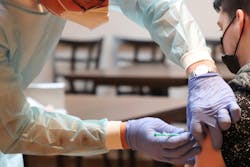People who survived COVID-19 may only need one dose of two-dose vaccines
People who have previously been infected with COVID-19 may need only one dose of the two-dose mRNA vaccines to achieve maximum protection against the virus, a small study from UCLA suggests.
But all vaccinated individuals, whether previously infected or not, will likely require booster shots moving forward because antibodies created through both vaccines and natural infection wane at the same relatively rapid rate, the authors say, according to a news release from UCLA.
In a study published in the journal ACS Nano, the researchers report that a previous COVID-19 infection effectively serves as the first “dose” of a two-dose vaccine, with one shot providing the same amount of protection in previously infected people as two shots would in those who have not been infected.
“Our data suggest that a person who previously had COVID-19 has a huge response after the first mRNA vaccination and has little or no benefit from the second dose,” said Otto Yang, Professor of Infectious Diseases and of Microbiology, Immunology and Molecular Genetics at the David Geffen School of Medicine at UCLA. “It is worth considering changing public health policy to take this into account, both to maximize vaccine usage and avoid unnecessary side effects.”
The researchers focused on the two-dose Pfizer-BioNTech and Moderna COVID-19 vaccines, both of which use mRNA technology to trigger the immune system to produce antibodies against the SARS-CoV-2 spike protein.
Clinical trials of these vaccines showed that two doses are roughly 95% effective at preventing symptomatic COVID-19 illness for the first few months after vaccination. These trials, however, included only a small percentage of participants who had already recovered from the disease and did not assess how previous infections affected the production of antibodies. In addition, the time course of antibody development in both uninfected and previously infected individuals and how long virus-neutralizing antibodies persist have remained unclear.
To answer those questions, Yang and his colleagues measured the level, quality, and persistence of COVID-19 antibodies after one and two doses of the mRNA vaccines in people who had experienced cases of COVID-19 and those who hadn’t.
For the 28 participants who had not had an infection, the first dose of either vaccine triggered antibody levels similar to those seen soon after mild COVID-19 infections; two doses were required to obtain antibodies approaching those observed soon after severe cases.
In contrast, among the 36 participants who had COVID-19 prior to being vaccinated, the first dose produced a vigorous antibody response similar to a severe natural infection, but the second dose provided no additional increase in antibody levels.
The quality of the antibodies produced — their ability to neutralize the SARS-CoV-2 spike protein — was found to be similar in both previously infected and uninfected participants. After the second vaccine dose, antibody levels waned in both groups, comparable to the decrease seen after natural infections, resulting in an average loss of 90% of antibodies within 85 days.
Although Yang noted that more research is needed on the response of the immune system’s T cells — and particularly long-lasting “memory” T cells — to the vaccines, he said the study findings on the sharp drop-off in antibodies in the months after vaccination suggest that booster vaccinations will likely be necessary for everyone to maintain protection against the virus.

